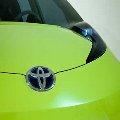Cobo Center is home to the 2010 North American Auto Show in downtown Detroit. For the event, the Center has been transformed into an expanse of flashy displays and trendy marketing displays, featuring the latest in automotive engineering.
Known as the Detroit Auto Show, the annual event is one of the industry's biggest. It helps generate publicity for some models, like the newly-redesigned Ford Focus , and it helps promote new technology, like the electric battery in the Chevrolet Volt.
But in the wake of one of the worst years for U.S. automobile sales, this year's show has a different feel. General Motors and Chrysler - two of the Detroit "Big Three" automakers, which also includes Ford - went bankrupt last year and received billions of dollars in federal aid. Although some of that money has been paid back, the U.S. government is still a major shareholder in both companies.
House of Representatives Speaker Nancy Pelosi does not call the assistance a bailout, but a loan she says was critical to the overall health of the U.S. economy.
"It wasn't about lending to automakers; it was about the survival of an industry," Pelosi said. "The survival of the auto industry is essential to a strong industrial, technological and manufacturing base in our country. And that industrial base is essential to our national security." Pelosi, along with about a dozen other U.S. lawmakers, toured the Auto Show during the first day of the media preview.
"This is an important visit for us," she noted. One of the priorities of their visit was to see how taxpayer money is being spent to develop new, environmentally-friendly technologies that will power cars of the future.
The Chevrolet Volt is leading the field in electric battery powered cars. Pelosi inspected the four-seat vehicle that touts a 64-kilometer range without using its gasoline engine.
Officials at Chevrolet say the Volt should be in U.S. showrooms by the end of the year, and that it is only one of a number of similar vehicles under development by most major automobile companies.
House Speaker Pelosi seemed impressed.
"We consider it a major threshold. We made the investments; we see the consequences of it; we report back to our colleagues and we look forward to seeing these cars in showrooms before the year is over," Pelosi said. But protesters outside Cobo Center see government assistance to the U.S. auto industry differently.
"No amount of government stimulation is ever going get us back on our feet," said Jeff McQueen, one of a handful of people loosely affiliated with the Tea Party political movement who braved the cold weather to send a message to visiting lawmakers. "The reason we're in the shape that we're in is because of government involvement," he noted. "The government is trying to sit there and demand that we have more fuel-efficient vehicles - government involvement in international trade legislation and North American trade legislation that has really been to the determent of U.S. and Canadian workers." Members of the media and the auto industry have access to the Auto Show this week. The general public will get a chance to see the latest in green technology and automobile design when the event opens on January 16.

